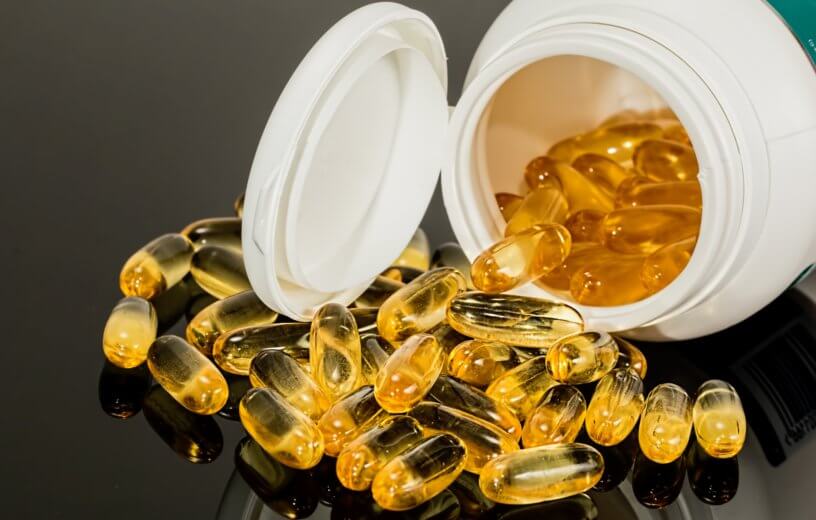COLUMBUS, Ohio — Omega-3 supplements are a booming business due to their ties to heart health and other benefits. While claims it can fight cancer, mental illness, and even COVID-19 are still up for debate, a new study finds taking omega-3 supplements may be a great way to ward off the damages of stress. Ohio State University researchers say large doses of omega-3 not only protects against stress-related inflammation, but also slows cellular aging.
The study reveals daily supplements with 2.5 grams of omega-3 polyunsaturated fatty acids boost the body’s defense against stress. Researchers note this amount is the highest dose tested and far exceeds what the average American consumes each day.
In comparison to a placebo of generic oils, participants taking omega-3 supplements produced less of the stress hormone cortisol. Researchers also discovered lower levels of a pro-inflammatory protein in their bodies while the group participated in a stress test. While participants taking a placebo experienced sharp declines in protective compounds during this exercise, the omega-3 group did not.
Study authors say omega-3 supplements contribute to what they call stress resilience. This is the reduction of harmful damage due to stress and the anti-inflammatory activity which protects parts of the cell that shrink due to aging. The OSU team adds omega-3’s impact on aging is particularly surprising because the participants in the study were generally sedentary, overweight, and middle-aged. These are all traits which usually put people at high risk for accelerated aging.
“The findings suggest that omega-3 supplementation is one relatively simple change people could make that could have a positive effect at breaking the chain between stress and negative health effects,” says lead author Annelise Madison in a university release.
A link to telomeres?
Madison works in professor of psychiatry and psychology Janice Kiecolt-Glaser’s lab at Ohio State. The new report follows up on studies revealing omega-3 supplements help preserve small portions of DNA in white blood cells. Scientists call these strands telomeres and they are one of the key measures of human biological aging.
Telomeres sit like caps on the ends of DNA. As the body ages, these caps get shorter and shorter. Although they don’t carry genetic information like the rest of DNA, telomeres play a role in keeping these strands stable. Researchers also note that factors like disease, especially heart disease, can speed up the shortening of these telomeres.
In their previous work, OSU researchers monitored changes in telomere length in white blood cells called lymphocytes. The new study examined how stress impacts a group of biomarkers which includes telomerase — an enzyme that rebuilds telomeres. Study authors say telomerase make a better target for measuring the impact of stress because levels of the enzyme react more quickly than the actual DNA caps do.
Researchers compared participants taking 2.5 grams or 1.25 grams of omega-3s daily, or a placebo containing various harmless oils. After four months, the group of 138 participants between 40 and 85 years-old took a 20-minute speech and math test. The exam is specifically designed to produce an inflammatory stress response in those who take it.
Results show those taking the highest doses of omega-3 had less stress-related damage than the placebo group. Cortisol levels were 19 percent lower and pro-inflammatory protein was 33 percent lower in the high omega-3 group.
How can a dietary supplement slow the aging process?
Blood samples reveal either dose of omega-3 fatty acids produces a change in telomerase levels. The supplements can also alter a protein which reduces inflammation in the two hours following acute stress. In people taking the placebo, the body’s repair mechanisms suffered under stress. Telomerase dropped by 24 percent on average and the anti-inflammatory protein fell by at least 20 percent in these patients.
“You could consider an increase in cortisol and inflammation potential factors that would erode telomere length,” Madison explains. “The assumption based on past work is that telomerase can help rebuild telomere length, and you want to have enough telomerase present to compensate for any stress-related damage.”
“The fact that our results were dose-dependent, and we’re seeing more impact with the higher omega-3 dose, would suggest that this supports a causal relationship,” the graduate student in clinical psychology adds.
Researchers believe that by lowering stress-related inflammation, omega-3 may also cut the connection between stress and depressive symptoms. Previous studies point to people who experience more inflammation while under stress are more likely to develop depression later on.
“Not everyone who is depressed has heightened inflammation – about a third do. This helps explain why omega-3 supplementation doesn’t always result in reduced depressive symptoms,” Kiecolt-Glaser concludes. “If you don’t have heightened inflammation, then omega-3s may not be particularly helpful. But for people with depression who do, our results suggest omega-3s would be more useful.”
The team notes the 2.5-gram dose of omega-3 fatty acids does not appear to cause any side-effects in patients.
The study appears in the journal Molecular Psychiatry.
